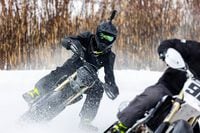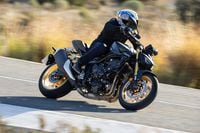Modern motorcycles are safer than ever, with anti-lock brakes, traction control, variable drive modes and God-knows-what-other technology. Add in the latest helmet advancements, airbag-equipped riding suits, back, chest and neck protection, and you might begin to think that motorcycling isn’t even risky anymore. Ironically, making that assumption is the most dangerous mistake you can make.
Overconfidence is one of the biggest dangers facing motorcyclists—and so-called "rider aids" are making riders more confident than ever before. A theory called the Risk Compensation Hypothesis says the safer (or more protected) an individual feels, the less cautiously he behaves. The result is that new innovations intended to reduce risk actually have precious little real-world effectiveness in decreasing accident rates. A growing body of scientific research suggests that, because of our tendency to risk-compensate, "safety" enhancements are just as likely to influence us to ride even harder, bringing the danger level right back to where it was before.
This might sound specious, but there’s persuasive evidence surrounding everything from seat belts to ski helmets to condom use to back up this theory. Anti-lock brakes are another oft-cited example: Common sense says ABS is safer, and if you’ve had any experience with it, you probably have an anecdote about how it’s saved you from a crash. But in automobiles, at least, ABS has failed to reduce the number of people being injured and killed in crashes by any significant amount.
One influential experiment monitored a fleet of taxis in Munich, Germany, some with ABS and some without. Over the three-year study the cabs were involved in 747 accidents, and the ABS-equipped cabs actually had a higher accident rate than the non-ABS cabs. Research by America’s Insurance Institute for Highway Safety (IIHS) backs up the fact that even today, when there are more ABS-equipped cars on the road than ever before, just as many people are being killed in ABS-equipped cars as their non-ABS counterparts.
The story is familiar: When half the states repealed helmet laws in the ’70s, deaths increased everywhere, but the greatest rises occurred in states that didn’t repeal helmet legislation. It’s the same with seat belts: They’re proven to save lives, but when they were enforced in the UK in ’83, the effect on overall road deaths was minimal. Deaths of front-seat occupants instantly dropped by 25 percent, but deaths of cyclists, pedestrians and rear-seat passengers all increased enough to virtually cancel out any benefit. Feeling safer, people drove more recklessly.
“The evidence from cars with ABS is that the improvement was consumed as a performance benefit rather than a safety benefit,” says John Adams, emeritus professor at University College London, who has written several books on risk compensation. “Accidents simply started happening at higher speeds.”
There’s an increasing movement in Europe to fight the effects of risk compensation by removing the perceived safety measures for road users. There have been several successful experiments showing that by removing barriers between cars and pedestrians, lowering sidewalks to the same level as the road and taking away road signs, drivers are forced to concentrate harder. The perception of risk is increased, and the number of accidents drops.
It’s our perception of risk that actually limits our actions and decisions at the handlebars. Ride down the street naked and helmetless and you’d be less likely to crash, since you’d be hyper-aware of the pain and suffering that would result from an error. Retaining this hyper-vigilant state even when fully geared up is your best protection against catastrophe, and being mindful of this reality is especially important in this modern age of increased rider aids. Anti-lock brakes and traction control are undeniably effective; just don’t let them lull you into a false sense of security. Be aware of the danger of risk compensation, and think of rider aids as something to increase your safety margin—not your speed. Then, you really will be safer.











/cloudfront-us-east-1.images.arcpublishing.com/octane/2WF3SCE3NFBQXLDNJM7KMXA45E.jpg)
/cloudfront-us-east-1.images.arcpublishing.com/octane/G4MG6OUCJNBSHIS2MVVOTPX65E.jpg)
/cloudfront-us-east-1.images.arcpublishing.com/octane/IIGGWFOTOJGB7DB6DGBXCCMTDY.jpg)
/cloudfront-us-east-1.images.arcpublishing.com/octane/QSTCM6AVEZA5JJBUXNIQ3DSOF4.jpg)
/cloudfront-us-east-1.images.arcpublishing.com/octane/U4I7G625B5DMLF2DVIJDFZVV6M.jpg)
/cloudfront-us-east-1.images.arcpublishing.com/octane/B6XD6LS6IVCQPIU6HXDJSM3FHY.jpg)
/cloudfront-us-east-1.images.arcpublishing.com/octane/ICL63FEDDRDTTMINYICCEYGMDA.jpg)
/cloudfront-us-east-1.images.arcpublishing.com/octane/FCGZHQXRBZFLBAPC5SDIQLVF4I.jpg)
/cloudfront-us-east-1.images.arcpublishing.com/octane/WNOB6LDOIFFHJKPSVIWDYUGOPM.jpg)

/cloudfront-us-east-1.images.arcpublishing.com/octane/X33NU3E525ECRHXLNUJN2FTRKI.jpg)
/cloudfront-us-east-1.images.arcpublishing.com/octane/6KKT5NNL2JAVBOXMZYS5ZO76YA.jpg)
/cloudfront-us-east-1.images.arcpublishing.com/octane/J5RKG5O455GMPGQRF2OG6LRT7A.jpg)
/cloudfront-us-east-1.images.arcpublishing.com/octane/GX2CIZKQVRH2TATDM26KFG2DAE.jpg)
/cloudfront-us-east-1.images.arcpublishing.com/octane/ZWIDYSAKQZHD5BHREMQILXJCGM.jpg)
/cloudfront-us-east-1.images.arcpublishing.com/octane/CYUHJZCTSJCH3MRAQEIKXK7SCQ.jpg)
/cloudfront-us-east-1.images.arcpublishing.com/octane/LKOFINY56FCXJCANJ5M7ZDQUBY.jpg)
/cloudfront-us-east-1.images.arcpublishing.com/octane/4NBPDACMWJH63JQYJVK3QRBDZI.jpg)
/cloudfront-us-east-1.images.arcpublishing.com/octane/KKHQHRR3FJGX7H2IPU6RALMWG4.jpg)

/cloudfront-us-east-1.images.arcpublishing.com/octane/5IOFS5JAE5FOXMNA23ZRAVVYUU.jpg)
/cloudfront-us-east-1.images.arcpublishing.com/octane/CGXQ3O2VVJF7PGTYR3QICTLDLM.jpg)

/cloudfront-us-east-1.images.arcpublishing.com/octane/OQVCJOABCFC5NBEF2KIGRCV3XA.jpg)